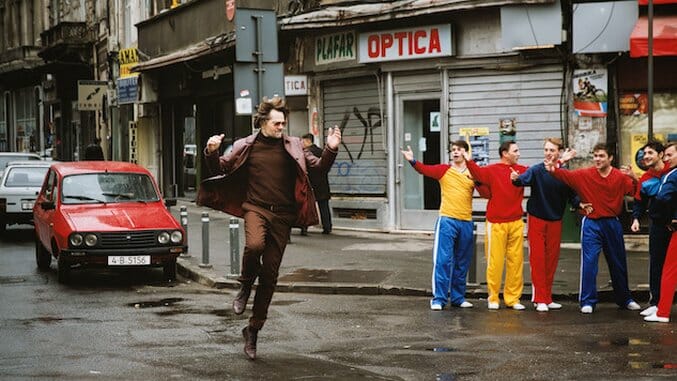How Amazon’s Comrade Detective Made a Long-Lost Romanian Cop Show from Scratch
Photo: Amazon Prime Video
Despite the glut of new TV shows that’s come to be known as “peak TV,” it’s rare that a work manages to come across as truly distinctive. Although they often tweak the formula, many series stick to recognizable premises—family sitcoms, Breaking Bad-esque crime dramas, fantasy or sci-fi explorations. That’s what makes the overdubbed, propaganda-steeped ‘80s cop show Comrade Detective such a breath of fresh air.
Like many great ideas, the concept for Comrade Detective came about almost by accident. The series’ writers and co-creators, Brian Gatewood and Allessandro Tanaka, knew they wanted to dub over a foreign show in the vein of films like Kung Pow: Enter the Fist or Woody Allen’s Tiger Lily, but they weren’t making any progress.
“We looked at global television to see if there was a show to dub. In the fashion of the old way we used to dub Japanese films and all that. What we found is that we couldn’t get any of the rights to anything,” Gatewood recalls.
The two kept digging, however, and their efforts were rewarded when they stumbled upon a documentary about an entire genre of television the Western world had missed.
“We came across a documentary from the mid-’80s on PBS, where a university in Minnesota had intercepted Soviet satellite [transmissions] of [Soviet] network television,” Gatewood explains. “They taped it all, studied it, and they would do an update on it every week.”
It didn’t take long for Gatewood and Tanaka to become fascinated with these Soviet-era TV shows. While the West devoured endless films that Gatewood describes as “America is great, the Soviet Union is evil,” the very same thing was happening across the Iron Curtain—but in reverse.
“What [the documentary] revealed was this bizarro universe. As we were kids, growing up watching Red Dawn and Rocky IV and all these movies where the Soviets were the villains, [Soviet viewers] sort of had their own experience,” Gatewood says. “Just like this crazy parallel.”
Immediately, the two saw the potential in bringing this virtually unknown genre to Western audiences, but as had been the case with everything they’d looked into to that point, they weren’t able to get their hands on the Cold War relics, no matter how perfect their finds were.
“We couldn’t get the rights to any of these shows,” Gatewood says. “Like this show called 30 Cases of Major Zeman from Czechoslovakia that was about a Communist detective, and the show was made to prop up Communist Party ideals.”
While dubbing a pre-existing show would have gotten the job done, Gatewood and Tanaka quickly realized they’d have more freedom if they created their own series and overdubbed that.
The pair didn’t want Comrade Detective simply to be a satirical remake of what had come before: They wanted it to feel synchronous with late-Cold War Romania. To that end, the series is presented as a long-lost Romanian cop show that’s only recently been recovered, restored and overdubbed for Western release. This was the idea that immediately intrigued Channing Tatum, independent production company A24 and director Rhys Thomas.
-

-

-

-

-

-

-

-

-

-

-

-

-

-

-

-

-

-

-

-

-

-

-

-

-

-

-

-

-

-

-

-

-

-

-

-

-

-

-

-








































